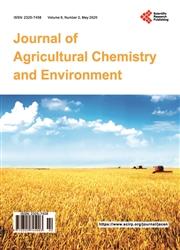Assessment of Phytosanitary Practices in Peri-Urban Agriculture and Associated Environmental and Health Impacts in Developing Countries: Case of Abengourou City (Côte d’Ivoire)
引用次数: 1
Abstract
The use of phytosanitary products remains uncontrolled and abusive in the practice of market gardening in most developing countries. However, it remains one of the potential sources of environmental contamination and public health problems. This study examines the health and environmental risks associated with the use of phytosanitary products in market gardening in the town of Abengourou in Cote d’Ivoire. Field surveys carried out among all (30) market gardener sites housed 150 farmers showed that when the products were spread, no health and safety measures were observed. Approximately 80% of the respondents did not wear gloves or face masks. Some products used were not approved for market gardening. Farmers had itching, dizziness, headaches, colds and vomiting on a regular basis when applying the products. The study also revealed the presence of empty packaging in the surrounding surface water and on the ground. In addition to producers, this type of uncontrolled market gardening likely exposes consumers to high health risks and also contributes to environmental degradation. Raising awareness among stakeholders of good agricultural practices could help promote sustainable market gardening. However, studies of the effects of products in such an environment on the health of consumers deserve to be carried out.评估发展中国家城市周边农业的植物检疫做法及其对环境和健康的相关影响:以阿本古鲁市(科特迪瓦)为例
在大多数发展中国家的市场园艺实践中,植物检疫产品的使用仍然不受控制和滥用。然而,它仍然是环境污染和公共卫生问题的潜在来源之一。这项研究考察了在科特迪瓦阿本古鲁镇市场园艺中使用植物检疫产品的健康和环境风险。对150名农民居住的所有(30)个市场园丁场地进行的实地调查显示,当产品传播时,没有观察到任何健康和安全措施。大约80%的受访者没有戴手套或口罩。一些使用的产品未被批准用于市场园艺。农民在使用这些产品时经常出现瘙痒、头晕、头痛、感冒和呕吐。该研究还揭示了周围地表水和地面上存在的空包装。除了生产者之外,这种不受控制的市场园艺可能会使消费者面临高健康风险,也会导致环境退化。提高利益攸关方对良好农业做法的认识有助于促进可持续的市场园艺。然而,值得对产品在这种环境中对消费者健康的影响进行研究。
本文章由计算机程序翻译,如有差异,请以英文原文为准。
求助全文
约1分钟内获得全文
求助全文

 求助内容:
求助内容: 应助结果提醒方式:
应助结果提醒方式:


